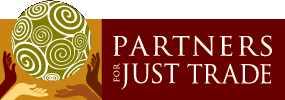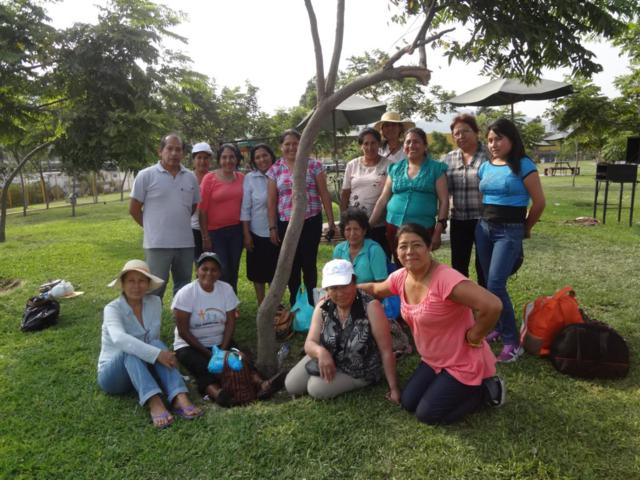
Producer Group Collective
Bridge Of Hope
Lima, Peru
Below is a list of the Bridge of Hope artisan groups with whom PJT works. By clicking on the group, you can learn more about them.
Emady is an artisan group established in 2005 which consists of three women who run a sewing business. The members of Emady met each other through a feeding and after-school care project that their children attended. Maria was a seamstress who worked in her home sewing for neighbors, while Eluteria and Dionisia cooked in the project's kitchen as volunteers so that their children could get one free meal.
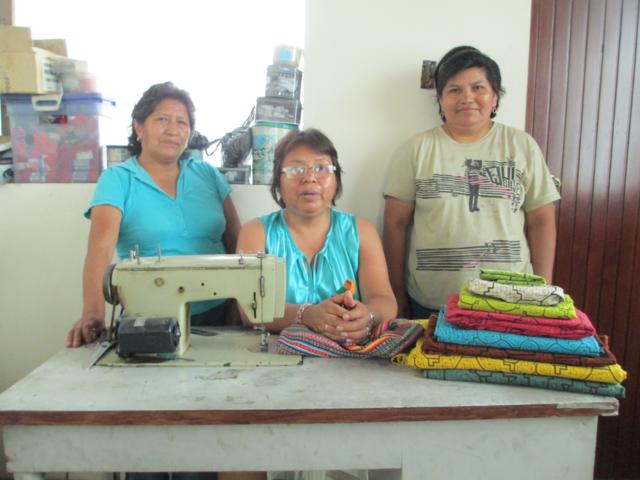
Maria, Eluteria and Dionisia in their workshop where they create manta and shipibo products.
La Esperanza grew out of the Maldonado Lazo family artisan business. Graciela’s entire family is involved in the artisan business, so she learned to weave at a young age. Her father gave her a little part of the store to sell her own designs, and she has continued to develop her own style and practice her own business skills through Fair Trade. The products that La Esperanza make feature traditional Andean motifs. They weave all of the fabrics and have a sewing machine in their house where everything is sewn together. The name of their group, which means “Hope” in Spanish, is a testament to what they have found through their participation with Bridge of Hope.
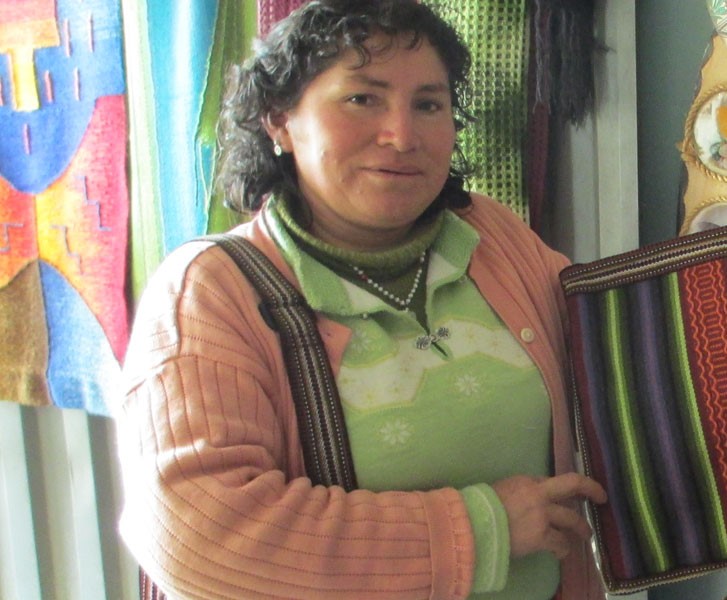
Graciela says, “Fair Trade has supported me… It has saved me. I am able to set aside and save the money I make in order to send my children to university.” The other group members are: Victor, Lucia, Georgina, Agripina, and Glider.
The women of Ima Sumacc dedicate themselves to knitting – both by hand and by machine – and make many products that live up to the name of their group, which in Quechua means “How beautiful!” However, through Bridge of Hope they were able to establish a stable workshop by buying a knitting machine and materials, and from that they were able to find stability with their families. These enterprising women have created a place that not only houses the creation of handmade products, but has also become an important place for solidarity and sharing.
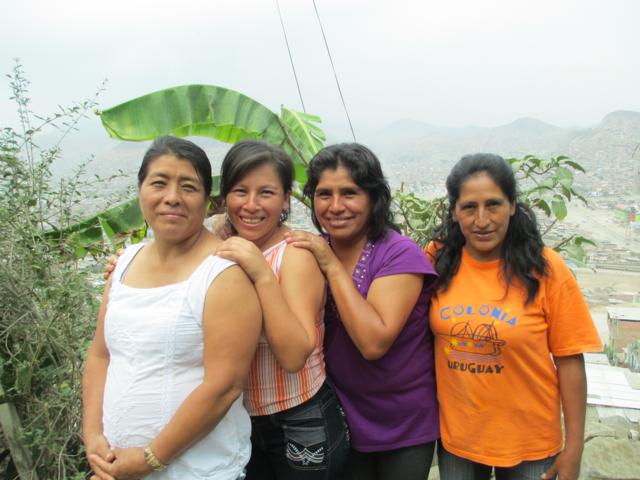
In the shantytown of Torres de Melgar in Lima’s violence-prone Villa María del Triunfo district, Isabel, Idelsa, Giovana, and Esperanza are sharing life together as friends and coworkers and learning what it is to overcome difficulties.
The name JUPA is an acronym for a group called "United Youth of Pamplona Alta" in a village in the highest part of the district of San Juan de Miraflores, south of Lima. These women use this art, along with their excellent sewing skills to fashion coin purses, eyeglass cases, and hair accessories, as well as detailed wall hangings. Because this work is so delicate, it takes very small pieces of fabric, and they can use recycled material or remnants from nearby clothing manufacturers. Also, through this business, they have found a source of work that allows them to be with their small children during the day.
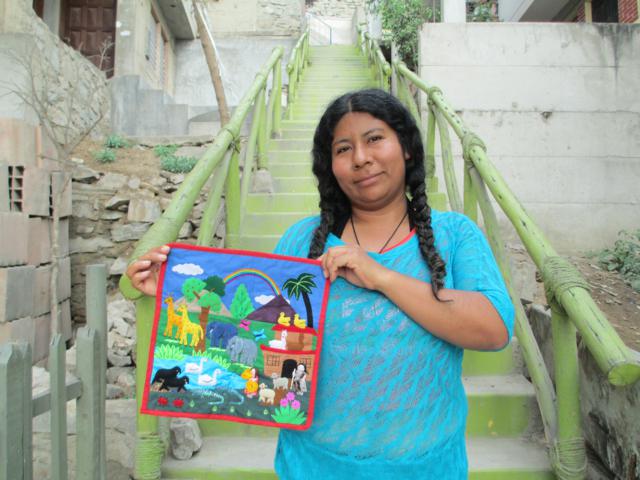
The artisan group Jupa is comprised of two young mothers, Balvina Huaytalla and Herlinda Escriba, who make beautiful arpilleras, a uniquely South American detailed form of appliqué.
When the women from Chorrillos in Lima established the group that would become Kuichi, their purpose was simply to mend clothes. The group was started by several women who gathered together to celebrate one another’s birthdays and holidays. One Mother’s Day, one of the mothers commented that the women present should form a sewing workshop to be able to economically support their families without leaving their children or their homes during the day. One of the members looked on the internet for ideas and came across Partners for Just Trade. Now they are part of Bridge of Hope, which helps them access more customers. They named their group Kuichi, which is the Quechua word for “rainbow.”
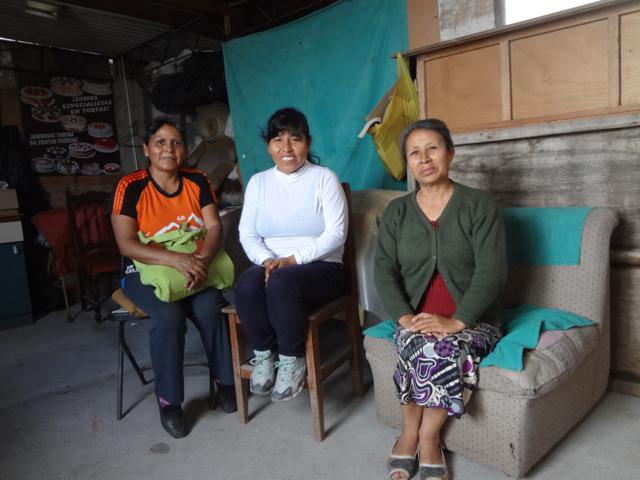
Jobita, Hidivia and Prisila in their workshop. Jobita shares her experiences: “For me, one of the best parts about working in Fair Trade is the flexibility and that I can always put my children and family first. When my husband got very sick I had to take care of him. Kuichi still paid me even though I couldn’t work.”
Llamkay Tuki is the artisan group that was selected out of a large group of qualified artists. Daniel, Rosa, Virgilio, and Joel live and work in Cochas, Huancayo, Peru. Their name, in the Quechua language, can be translated as "beautiful work". They have learned how to pick out gourds of the best quality, which they clean carefully before they sketch the design on them in pencil. Daniel specializes in burning the design into the gourd; then Rosa carves the thin, delicate lines that outline the design. Working within Fair Trade has also taught this group how to run a business well.
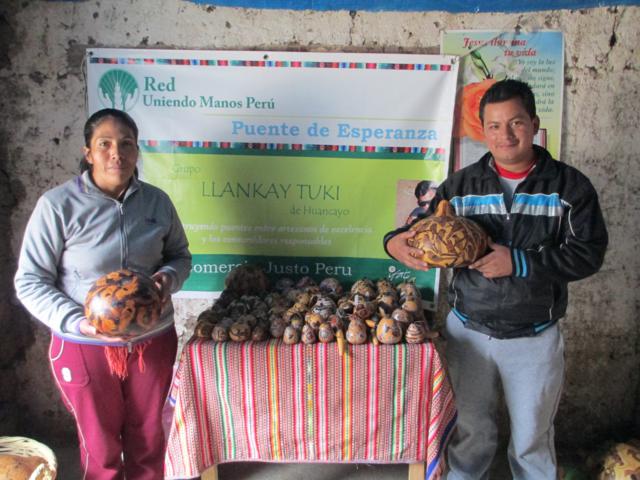
Here we see Daniel and Rosa in their workshop. Daniel says, “Fair Trade has helped us a lot to work on the quality and how to buy gourds of top quality. It has also helped us improve our living situation… We have learned with Fair Trade to share equally.”
Maná Color is a sewing group that makes many products, specializing in products made from the colorful mantas, which women in the Andes Mountains use to carry their babies, and in products made from repurposed fabric flour sacks. The group formed in 2001 and works out of their workshop that is on the second floor of the house of Maná member Berta Flores. The members jumped at the opportunity to work with Bridge of Hope, even though they didn’t all know how to sew. With the support of Bridge of Hope, they learned about taxes, bookkeeping, and took sewing lessons. They have also learned to shares their struggles, grow as people, and value themselves and the work that they do.
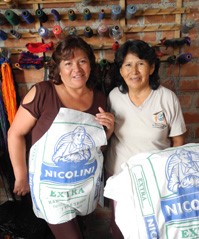
Producers Berta Flores and Emilia Serrano pose together with their uniquely hand-made aprons made from recycled flour sack material.
El Mercurio is named for the historic mercury mine, founded in 1530 in Peru's Santa Barbara community, the birthplace of many of the group's members. The women had incredible knitting abilities, but had been unable to channel their talent in a marketable way. They washed clothes in the river, shined shoes, and worked as maids for other Huancavelica families, but none of these jobs provided a way out of extreme poverty. Now over thirty members gather to knit many varieties of animals and finger puppets. In addition to increasing the members' income exponentially over the years, the workshop acts as a safe space for them to share the joys and challenges of their everyday lives.
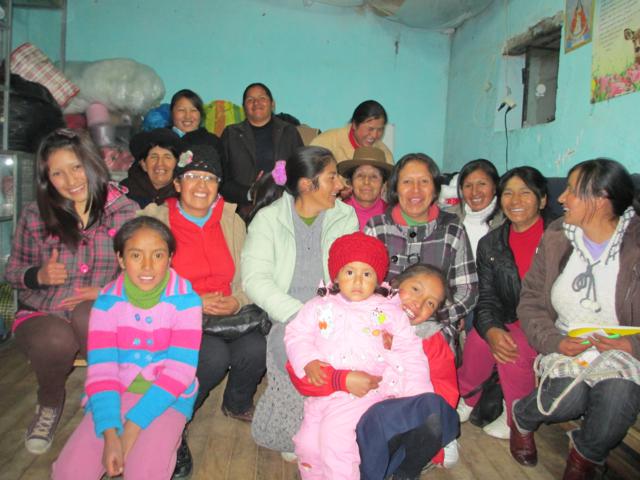
The El Mercurio knitting group began in 2003 with five enthusiastic women in Huancavelica, Peru. Here we see the members of the group with their children in their workshop! The members of El Mercurio are: Yody, Sandra, Rosita, Rufina, Tomotea, Julia, Juanita, Antonia, Hayde, Sixta, Rosalina, Rebeca, Reyna, Eusebia, Tanita, Paulina, Tania, Silvia, Domitila, Aydeé Riveros, Aydee Romo, Elisa, Reneé, and Luzmila.
Munay Rumi is a small artisan group of jewelry makers based in the outskirts of Lima, Peru. They are dedicated to maintaining the highest standards and have shown great commitment to upholding Fair Trade principles. They moved to Lima from Cuzco in the early 1990s to find more opportunities and still speak Quechua with each other and in their homes. In Quechua, Munay Rumi means “pretty stone.” After years of monotonous work in a jewelry factory, working 80-hour weeks for only $115 a month, members of the group decided to leave to form their own business. They heard about this Fair Trade project and became involved, forming Munay Rumi.
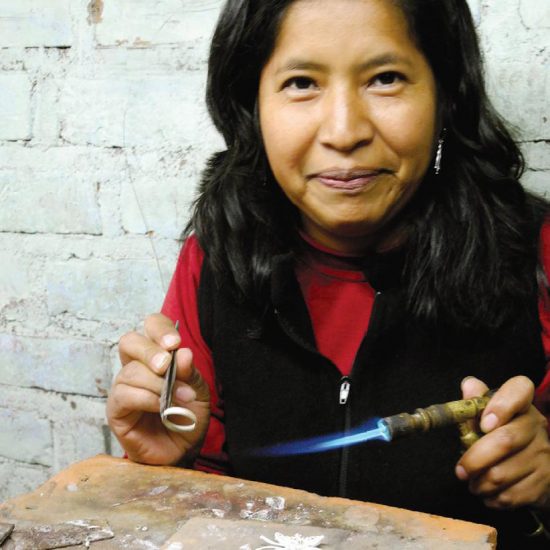
Silvia Vargas in Munay Rumi’s workshop working on some new jewelry! Silvia, Ernesto and Luis specialize in silver filigree and textura jewelry and shape each detail by hand.
The group's members, numbering at times up to twenty, grew up knitting but could not receive a fair wage for their work locally. In 2006 they began to work with Bridge of Hope, who exported their socks, which incorporate traditional Incan patterns. The members of Tupaq Yupanqui, with their business knowledge gained through Fair Trade, have faith in this sustainable way to improve their livelihoods. Since 2006, the group has increased sales, adding alpaca hats and gloves to their products. Their confidence continues to grow as they work on pricing, quality control and design, hoping to escape from poverty through their work.
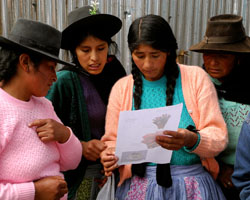
Named for an Incan emperor, Tupaq Yupanqui is a group of knitters who live in a small Andean village outside of Yauli, in the Huancavelica province of Peru. The group members are: Concepciona, Claudia, Juanita, Ezequiel, Niry Luz, Lucy, Suna, Claudia, Emilia, and Dina.
The five women artisans of Warmi Llancashan live in the shantytown called, interestingly enough, "Development-Bound". The town's name speaks volumes about what people want: basic social and economic development. For years, the women have met regularly to help each other in the production of handicrafts to supplement their income. Through the Joining Hands Network member organization Fraternidad Cristiana Vida, they became acquainted with the Bridge of Hope, and began handicraft design and production. In Quechua, Warmi Llancashan means “woman worker.” With the income from Warmi Llancashan, the women have been able to help support their families and pay for improvements on their houses that would otherwise have been impossible, and they have hope for the future.
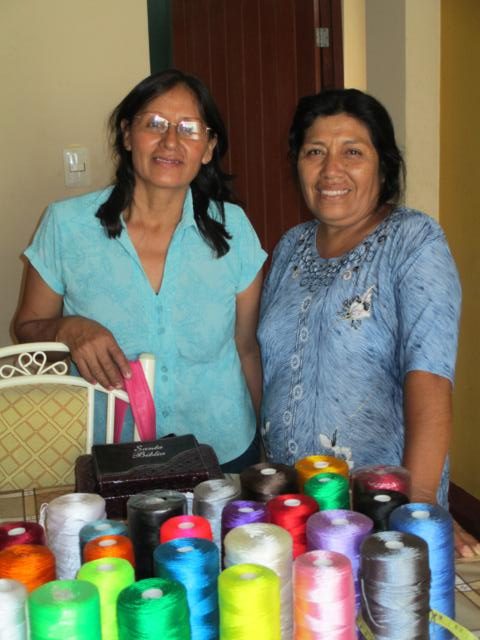
The members of Warmi Llancashan are Olga Minaya, María Minaya, Felicita Reyes, Mercedes Ramirez, and Consuelo Cangalaya. Here we see Olga and Felicita in their workshop.
Yuraq Allpa, an artisan group established in 2008, depends on making ceramics to support their families. The name Yuraq Allpa means “White Dirt” in Quechua. The members of the group grew up in Ayacucho and came to Lima during the years of terrorism in the 1980s and 1990s. In Ayacucho there is a lot of clay in the soil that makes the ground white. In order to remember their home, they named their group Yuraq Allpa. They have always dedicated themselves to this work and being a part of Bridge of Hope has provided more opportunities to work. Anita Contreras says, “The situation is very critical. The product we can sell in Peru does not supply us with enough.” Fair Trade has opened their eyes to a whole new world of fair wages and sustainable business.
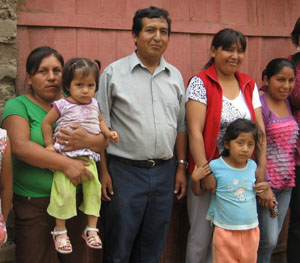
The members of Yuraq Allpa and their children outside of their workshop. Group Members: Anita Contreras Navarro, Emiliano Nolasco Palomino, Carlos Huaman Villacrisis, Victoria Contreras Navarro, Yolanda Contreras Navarro.
